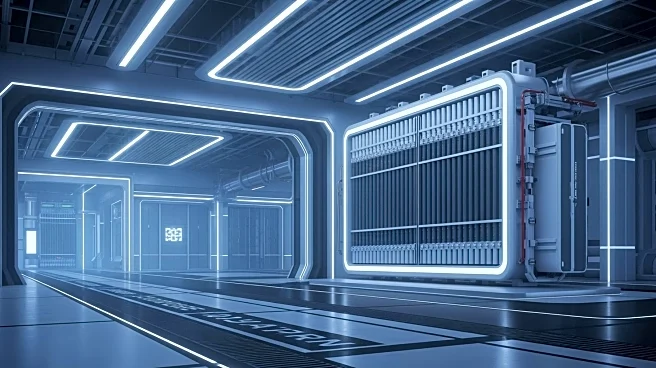What's Happening?
Rondo Energy, a California-based company, has launched its 100-MWh Rondo Heat Battery (RHB) in Kern County, California. The battery, powered by a 20-MW solar array, replaces a natural gas-fired boiler
at an enhanced oil recovery site operated by Holmes Western Oil Corp. The RHB heats clay bricks with electricity to generate steam, which is used for oil extraction. This project aims to reduce energy cost volatility and regulatory exposure by substituting gas consumption with solar power. The RHB has achieved milestones in daily automatic operation, performance, and efficiency, boasting storage temperatures above 1,000C and round-trip efficiency above 97%. The technology is designed to reduce costs and emissions for industries reliant on high-temperature heat.
Why It's Important?
The deployment of the Rondo Heat Battery represents a significant advancement in industrial energy solutions, offering a sustainable alternative to traditional gas-fired systems. By reducing carbon emissions and energy costs, the technology enhances competitiveness in low-carbon markets. This development is crucial as industrial heat accounts for 25% of global energy use, and the transition to renewable energy sources is vital for addressing climate change. The RHB's ability to operate using low-cost electricity hours further underscores its potential to revolutionize industrial energy consumption, paving the way for broader adoption across various sectors.
What's Next?
Rondo Energy is expanding its operations globally, with projects underway in North America, Europe, Asia, and Australia. The company is targeting industries such as chemicals, biofuels, food and beverage, and cement. As the technology scales quickly without relying on scarce minerals, it is poised to become a key player in the industrial energy market. The success of the RHB could lead to increased investment in similar technologies, further driving the shift towards renewable energy in industrial applications.
Beyond the Headlines
The Rondo Heat Battery's use of abundant materials like brick and wire ensures safety and reliability, eliminating risks associated with toxic leaks or fires. Its seamless integration into existing systems without emissions or air permits simplifies deployment, making it an attractive option for industries seeking to reduce their environmental impact. The commercialization of heat batteries could open new markets for renewable electricity, similar to the impact of electric vehicles on transportation.









